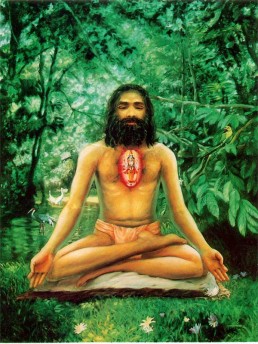Swami Chinmayananda
Swami Chinmayananda Commentary
To one who is “DESIRING TO SCALE OVER THE PRACTICE OF MENTAL CONCENTRATION AND SELF-IMPROVEMENT, WORK IS SAID TO BE THE MEANS.” By working in the world with neither the ego-centric concept of agency nor the ego-centric desires for the fruits of those actions, we are causing vasanas to play out without creating any new precipitate of fresh impressions.
The metaphor used here is borrowed from horse-riding, and it is very powerful in its suggestions. When a wild horse is being broken in, for some time, it will ride the rider before the rider can ride it. If one desires to bring a steed under perfect control, there is a period when, with one leg on the stirrup, the individual has to hang on to the saddle and with the other leg on the ground, must learn to kick himself off from the ground and spring up and throw his legs over the back of the animal, until he sits, with the steed completely between his own legs. Having mounted, it is easy to control the animal, but till then, the rider, in his attempt to mount the horse, must pass through a stage where he is neither totally on the horse nor on the ground.
In the beginning, we are merely workers in the world; desire-prompted and ego-driven, we sweat and toil, weep and sob. When an individual gets tired of such activities, he comes to desire to mount the steed of the mind. Such an individual, desiring to bring the mind under his control and rise over it (Arurukshah) takes upon himself the same work as before, but without the ego and ego-centric desires. Such desireless activities undertaken in the Yajna-SPIRIT explained earlier, (IV-18, 19 20, 21, and 25 to 30.
) cleanse the mind of its past impressions and integrate the entire inner equipment. When thus the required amount of concentration has been gained by the individual as a result of the vasana-purgation effected, he is to stop his activities slowly and apply himself more and more to live in deeper meditation. When once his mind has been conquered, and his agitations have become well-controlled, the seeker in that state of mental growth and development, is termed as “having mounted the steed of the mind” (Yoga-Arudhah). To such an individual, in that state of mental equipoise and self-application, “quiescence” (Shama) is the means for gaining higher perfection and self-growth.
By thus prescribing two methods at the two distinct stages of the individual’s growth, it is meant that they are not contradictory. Selfless activity is good at a stage but afterwards it becomes a positive agitation which brings the mind down from its serener flights, and frequently bumps it on the ground with a shattering shock. Specially prepared milk powder, diluted with hot water, is the full diet for an infant. But the same feeding-bottle will not satisfy the growing demands of a boy vigorously working and mischievously knocking about all day. The more solid bread and butter are his diet. We need not be great intellectuals to understand that buttered toast will choke and kill an infant.
Similarly here, work without self is healthy for the beginner, but a developed seeker needs more and more quietude and self-withdrawal for growing in the steady contemplation of life within. Earlier, ‘work-without-self’ is the means, afterwards ‘work-on-self’ is the means; and the process is continued until, working or not working, through meditation, it is realised that the Self alone is the essence in the ego which, till then, was recognised as the only reality.
In this sense of the term, we clearly know how ritualism has a definite place in the scheme of things as mapped out by the Vedantin Seers of unimpeachable intellectual eminence.
WHEN IS A MAN SAID TO BE A YOGARUDHAH — TO HAVE ATTAINED TO YOGA?… THE ANSWER FOLLOWS:
Adi Sankara Commentary
Aruruksoh, for one who wishes to ascend, who has not ascended, i.e. for that very person who is unable to remain established in Dhyana-yoga;-for which person who is desirous to ascend?-munch, for the sage, i.e. for one who has renounced the results of actions;-trying to ascend to what?-yogam, to (Dhyana-) yoga; karma, action; ucyate, is said to be; the karanam, means. Tasya, for that person, again; yoga-arudhasya, when he has ascended to (Dhyana-) yoga; samah, inaction, withdrawl from all actions; eva, alone; ucyate, is said to be; karanam, the means for remaining poised in the state of meditation. This is the meaning. To the extent that one withdraws from actions, the mind of that man who is at cease and self-controlled becomes concentrated. When this occurs, he at once becomes established in Yoga. And accordingly has it been said by Vyasa: ‘For a Brahmana there is no wealth conparable to (the knowledge of) oneness, sameness, truthfulness, character, equipoise, harmlessness, straightforwardness and withdrawal from various actions’ (Mbh. Sa. 175.37). After that, now is being stated when one becomes established in Yoga:
The Bhagavad Gita with the commentary of Sri Sankaracharya – Translated by Alladi Mahadeva Sastry
Holy Geeta – Commentary by Swami Chinmayananda
The Bhagavad Gita by Eknath Easwaran – Best selling translation of the Bhagavad Gita
The Bhagavad Gita – Translation and Commentary by Swami Sivananda
Bhagavad Gita – Translation and Commentary by Bhaktivedanta Swami Prabupadha
Srimad Bhagavad Gita Chapter 6 – Verse 3 – 6.3 aruruksormuneryogam karma – All Bhagavad Gita (Geeta) Verses in Sanskrit, English, Transliteration, Word Meaning, Translation, Audio, Shankara Bhashya, Adi Sankaracharya Commentary and Links to Videos by Swami Chinmayananda and others – 6-3

